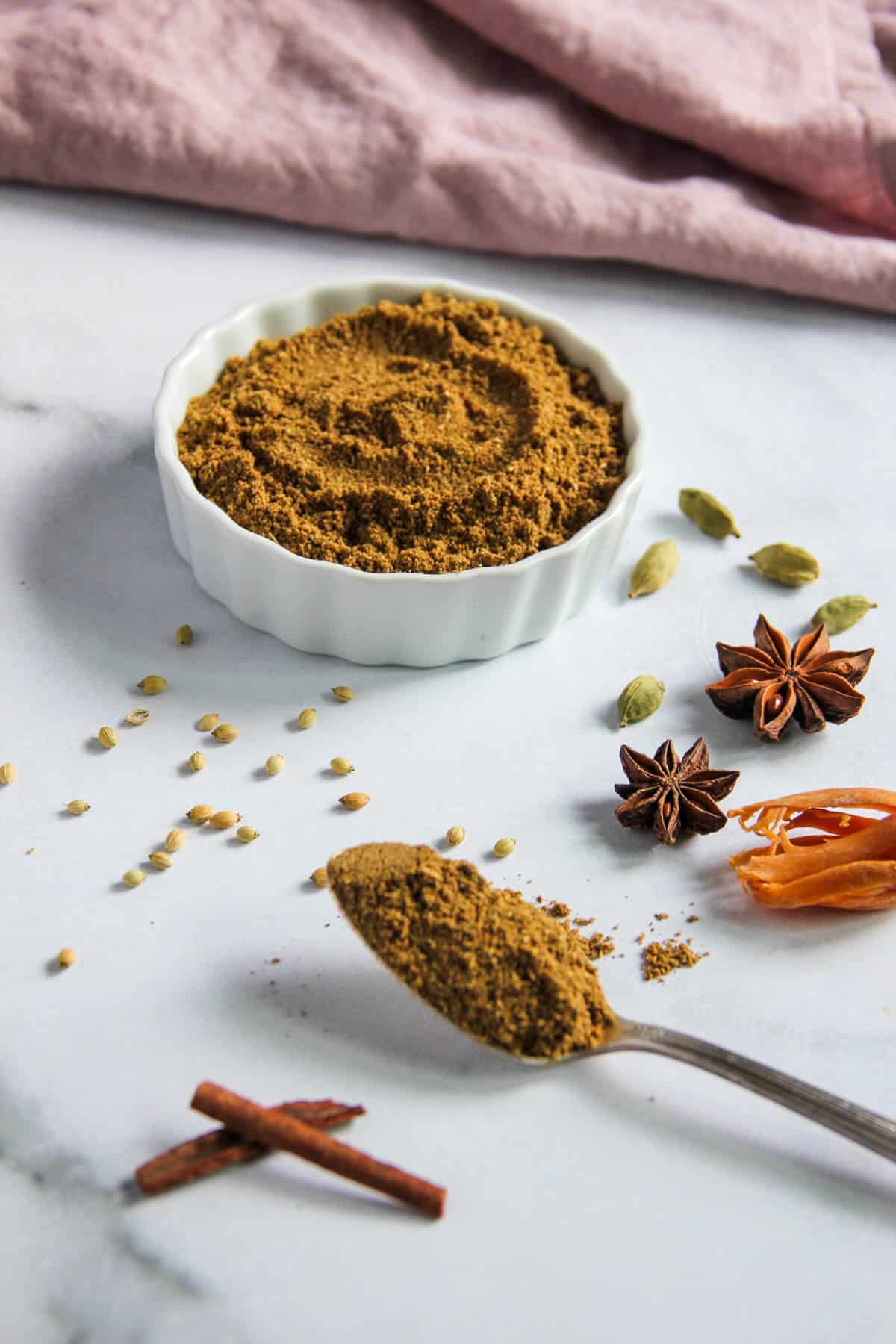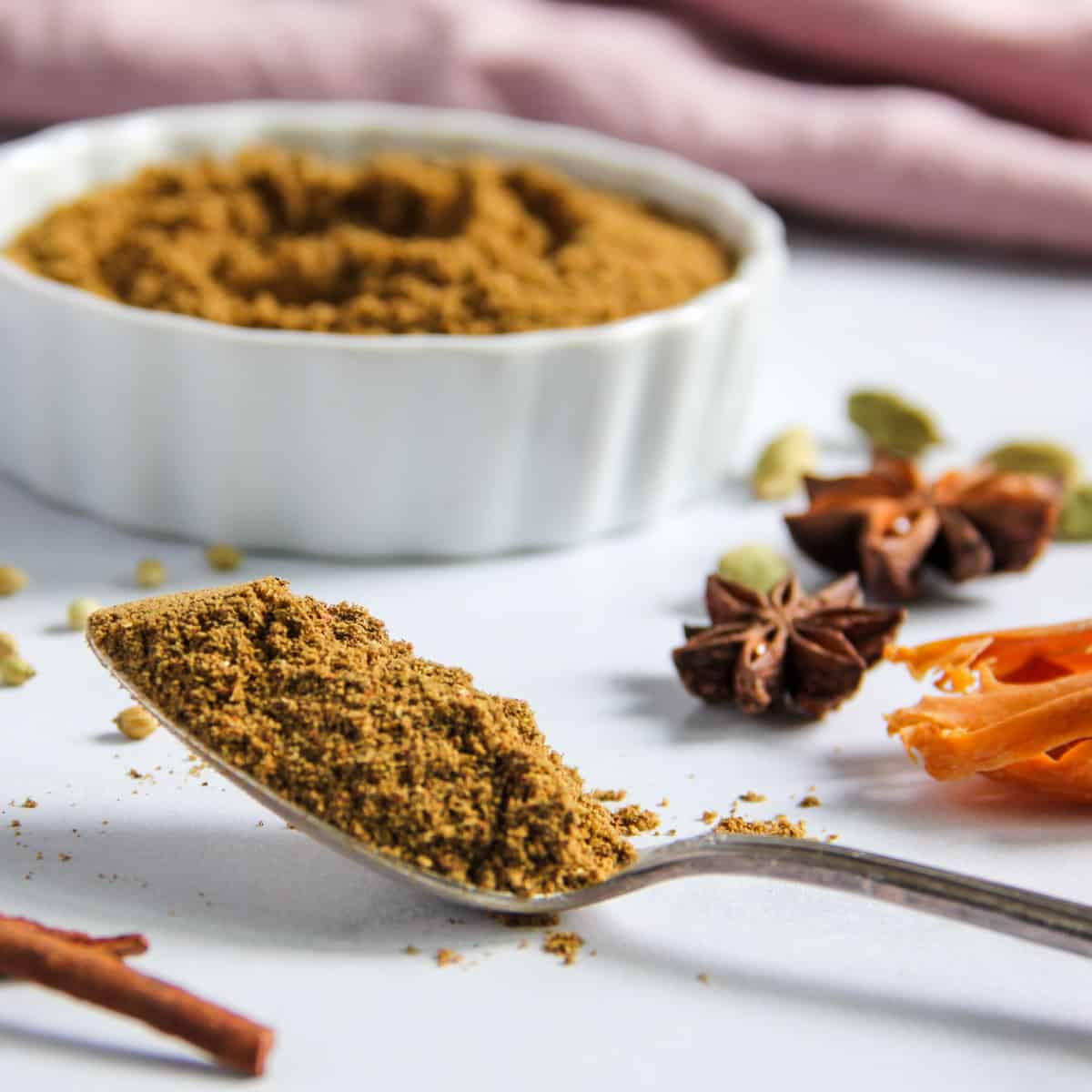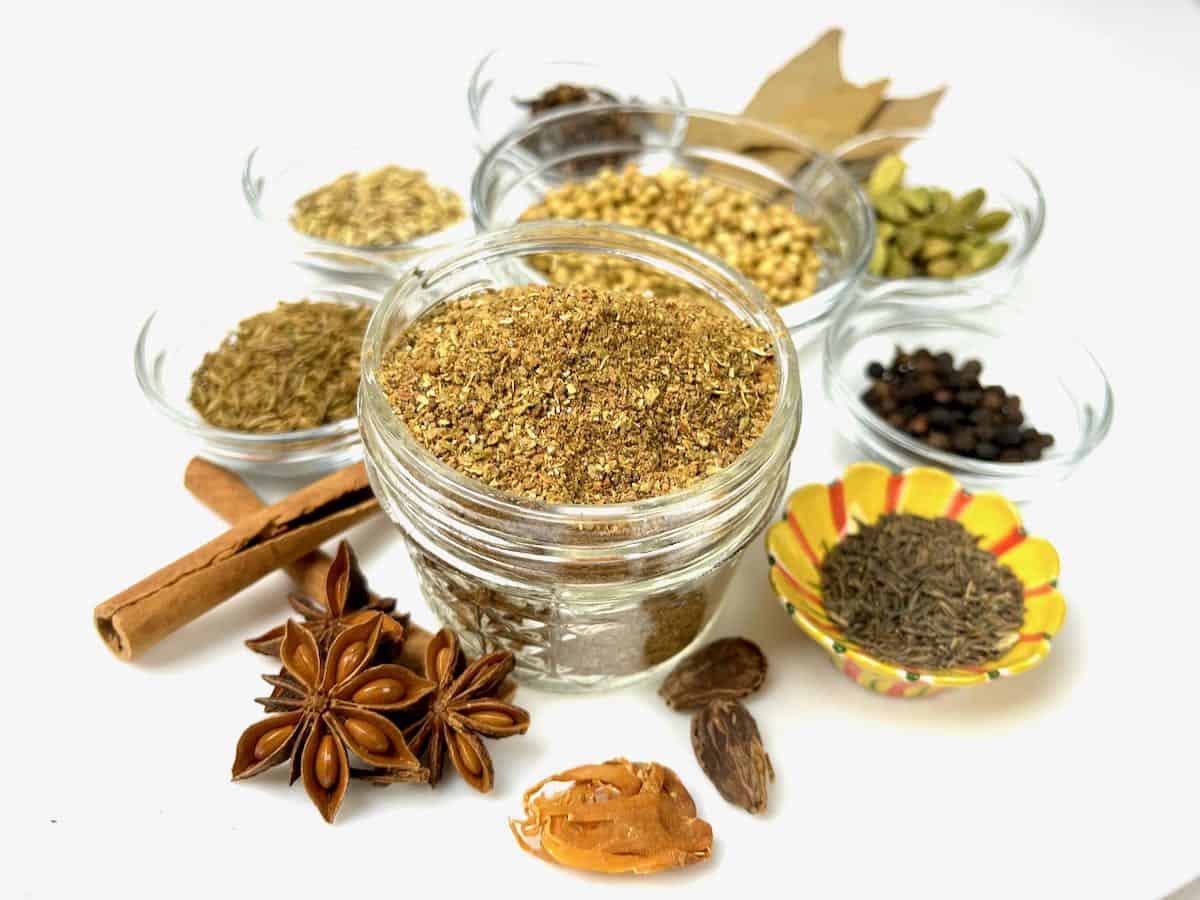
Introduction
What Is Biryani Masala And Its Importance In Biryani
Biryani masala is a blend of ground spices that is used to enhance the flavor and aroma of biryani, a popular South Asian rice dish. This spice mixture can vary from region to region and even from one recipe to another. To make biryani, whole spices are toasted and ground to create the biryani masala. The use of biryani masala is crucial in achieving the authentic taste and aroma of this beloved dish.
The Significance Of Spices And Aromas In Biryani
Biryani is not just a dish; it is a sensory experience. The blend of spices in biryani masala creates a symphony of flavors that dance on your palate. Each spice in the masala contributes to the overall taste and aroma of the dish. Here are some commonly found spices in biryani masala and their roles:
- Cinnamon: Adds a warm and sweet flavor to the biryani, enhancing the overall taste.
- Cardamom: Provides a distinct fragrance and a subtle sweet flavor to the dish.
- Cloves: Contributes a strong, pungent flavor that adds depth to the biryani.
- Star anise: Imparts a unique licorice-like flavor that adds complexity to the dish.
- Cumin: Adds a warm and earthy flavor to the biryani, enhancing its overall taste.
- Coriander: Provides a fresh and citrusy flavor that balances the other spices in the masala.
- Turmeric: Adds a vibrant yellow color to the biryani and lends a mild earthy flavor.
- Nutmeg: Gives a warm and slightly sweet flavor to the biryani, adding depth to the dish.
- Fennel seeds: Contributes a mild and slightly sweet flavor that complements the other spices in the masala.
The combination of these spices in biryani masala creates a harmonious balance of flavors, resulting in a rich, aromatic, and delicious biryani. The spices not only enhance the taste but also give biryani its signature aroma that is hard to resist. So, the next time you prepare biryani, make sure to use a good quality biryani masala to elevate the flavors and aromas of this classic dish.
Origin And History
The Origins Of Biryani Masala
Biryani, a flavorful and aromatic rice dish, has a long history that traces back to ancient Persia. The word “biryani” is derived from the Persian word “birian,” which means “fried before cooking.” It is believed that the Mughals introduced biryani to the Indian subcontinent during their rule. Over time, biryani evolved and adapted to the local flavors and ingredients, resulting in various regional variations.
The use of biryani masala, a blend of ground spices, became an integral part of the biryani preparation. The exact origin of biryani masala is unclear, but it is believed to have originated in the royal kitchens of the Mughal emperors. The Mughals were known for their love of rich and aromatic food, and biryani masala was a key ingredient that elevated the flavors of biryani.
Historical Uses Of Spices In Biryani
Spices have played a significant role in biryani since its inception. Ancient texts and historical records mention the use of various spices in biryani preparations. Each spice not only adds a distinct flavor but also contributes to the overall aroma of the dish.
Here are some examples of historical uses of spices in biryani:
- Cinnamon: This spice adds a warm and sweet flavor to the biryani, enhancing its taste.
- Cardamom: Known for its distinct fragrance and subtle sweet flavor, cardamom is a commonly used spice in biryani.
- Cloves: These pungent and flavorful spices add depth and richness to the biryani.
- Star anise: With its unique licorice-like flavor, star anise adds complexity to the biryani.
- Cumin: This warm and earthy spice enhances the overall taste of the biryani.
- Coriander: Providing a fresh and citrusy flavor, coriander balances out the other spices in the masala.
- Turmeric: Apart from lending a vibrant yellow color, turmeric also adds a mild earthy flavor to the biryani.
- Nutmeg: With its warm and slightly sweet flavor, nutmeg adds depth and richness to the dish.
- Fennel seeds: These mildly sweet seeds complement the other spices in the masala, enhancing the overall flavor of the biryani.
These spices, along with many others, combine to create a harmonious balance of flavors and aromas in biryani. The use of spices not only enhances the taste but also gives biryani its signature aroma that is hard to resist. So, the next time you prepare biryani, remember to use a good quality biryani masala to elevate the flavors and aromas of this classic dish.
Common Ingredients In Biryani Masala
Exploring The Common Spices Used In Biryani Masala
Biryani masala is a spice blend that consists of various ground spices. While the exact recipe can vary, depending on regional preferences and personal taste, there are some common spices that are often used in biryani masala. Some of these spices include:
- Cinnamon: It adds a warm and sweet flavor to the biryani.
- Cardamom: Known for its distinct fragrance and subtle sweet flavor, cardamom is a commonly used spice in biryani.
- Cloves: These pungent and flavorful spices add depth and richness to the biryani.
- Star anise: With its unique licorice-like flavor, star anise adds complexity to the dish.
- Cumin: This warm and earthy spice enhances the overall taste of the biryani.
- Coriander: Providing a fresh and citrusy flavor, coriander balances out the other spices in the masala.
- Turmeric: Apart from lending a vibrant yellow color, turmeric also adds a mild earthy flavor to the biryani.
- Nutmeg: With its warm and slightly sweet flavor, nutmeg adds depth and richness to the dish.
- Fennel seeds: These mildly sweet seeds complement the other spices in the masala, enhancing the overall flavor of the biryani.
The Flavors And Aromas They Add To The Dish
Each spice used in biryani masala contributes its unique flavors and aromas to the dish. The combination of these spices creates a harmonious blend that enhances the taste and aroma of the biryani. Here’s how each spice adds to the overall flavor profile:
- Cinnamon adds a warm, sweet, and slightly spicy note to the biryani.
- Cardamom brings a floral, citrusy, and slightly sweet aroma to the dish.
- Cloves offer a pungent and slightly bitter flavor, adding depth to the biryani.
- Star anise provides a distinct licorice-like flavor and a subtle sweetness.
- Cumin brings a nutty, earthy, and slightly spicy taste to the biryani.
- Coriander adds a refreshing and citrusy flavor that complements the other spices.
- Turmeric lends a vibrant yellow color and a mild earthy taste.
- Nutmeg offers a warm, slightly sweet, and nutty flavor profile.
- Fennel seeds contribute a mildly sweet and licorice-like taste, enhancing the overall flavor of the biryani.
These spices, combined in the right proportions, create a rich and aromatic biryani masala that takes the flavors of the dish to the next level. Whether you’re using a store-bought biryani masala or making your own at home, these common ingredients are essential for achieving that authentic taste and aroma in your biryani.

Homemade Biryani Masala Recipes
Traditional Biryani Masala Recipe
For those who prefer the authentic taste and aroma of homemade biryani masala, here’s a traditional recipe you can try:
Ingredients:
- 2 cinnamon sticks
- 4 green cardamom pods
- 4 cloves
- 2 star anise
- 1 tablespoon cumin seeds
- 1 tablespoon coriander seeds
- 1 teaspoon turmeric powder
- 1/2 teaspoon nutmeg powder
- 1 teaspoon fennel seeds
Instructions:
- Heat a dry pan over medium heat and add the cinnamon sticks, green cardamom pods, cloves, star anise, cumin seeds, coriander seeds, and fennel seeds.
- Toast the spices for a few minutes until fragrant and slightly golden. Be careful not to burn them.
- Remove the pan from heat and let the spices cool completely.
- Once cooled, transfer the toasted spices to a spice grinder or mortar and pestle.
- Grind the spices until you have a fine powder.
- Add the turmeric powder and nutmeg powder to the ground spices. Mix well to combine.
- Your homemade biryani masala is ready to use!
Quick And Easy Biryani Masala Recipe
If you’re short on time and still want to enjoy the flavors of homemade biryani masala, here’s a quick and easy recipe:
Ingredients:
- 2 teaspoons cumin powder
- 2 teaspoons coriander powder
- 2 teaspoons turmeric powder
- 1 teaspoon garam masala
- 1/2 teaspoon red chili powder
- 1/2 teaspoon black pepper powder
Instructions:
- In a small bowl, combine the cumin powder, coriander powder, turmeric powder, garam masala, red chili powder, and black pepper powder.
- Mix well until all the spices are evenly combined.
- Your quick and easy biryani masala is ready to use!
Now that you have these homemade biryani masala recipes, you can easily prepare flavorful biryani right in your kitchen. Experiment with these spice blends and adjust the quantities as per your preference to create your own signature masala. Enjoy the delicious aroma and taste of homemade biryani with the perfect blend of spices!
Store-bought Biryani Masala Options
Popular Brands Of Biryani Masala Available In The Market
There are several popular brands of store-bought Biryani Masala available in the market. Some of the well-known ones include:
- Everest Biryani Masala: This brand is known for its quality spices and is widely used in Indian households.
- MDH Biryani Masala: Another popular brand, MDH offers a range of spice blends, including Biryani Masala.
- Shan Biryani Masala: Shan is a trusted name when it comes to spice blends, and their Biryani Masala is no exception.
- Badshah Biryani Pulao Masala: Badshah is known for its authentic flavors, and their Biryani Masala is a favorite among many.
Comparing Different Store-bought Biryani Masala Mixes
Here’s a comparison of some key factors to consider when choosing a store-bought Biryani Masala mix:
| Brand | Ingredients | Aroma | Flavor | Spice Level |
|---|---|---|---|---|
| Everest | Aromatic spices like cardamom, cloves, cinnamon, and mace | Strong and aromatic | Rich and flavorful | Moderate |
| MDH | Mix of spices including cardamom, cloves, cinnamon, and more | Fragrant | Balanced and aromatic | Mild |
| Shan | Blend of spices including cloves, cinnamon, and mace | Aromatic | Authentic and flavorful | Moderate |
| Badshah | Mix of spices including cardamom, cloves, cinnamon, and more | Aromatic and enticing | Savory and aromatic | Mild |
When choosing a store-bought Biryani Masala mix, consider the brand that aligns with your taste preferences and the level of spiciness you prefer in your dish. It’s also a good idea to read reviews and gather feedback from others who have used the specific brand to ensure you are getting a quality product.
Tips For Using Biryani Masala
How To Use Biryani Masala Effectively In Your Cooking
Some tips for using Biryani Masala effectively in your cooking include:
- Start by sautéing onions and garlic in oil before adding the Biryani Masala. This enhances the flavor and aroma of the spices.
- Add the Biryani Masala towards the end of your cooking process to prevent the spices from losing their potency.
- Use the Biryani Masala as per your taste preference, keeping in mind that different brands may have different spice levels. Adjust the quantity accordingly.
- Allow the Biryani Masala to cook with the other ingredients for a few minutes to ensure that the spices are well incorporated and evenly distributed.
Blending Biryani Masala With Other Spices
To enhance the flavors of your Biryani even further, you can consider blending Biryani Masala with other spices such as:
- Turmeric: Adding a pinch of turmeric powder can enhance the color of the Biryani and add a subtle earthy flavor.
- Red chili powder: If you prefer a spicier Biryani, you can add some red chili powder along with the Biryani Masala.
- Garam Masala: Adding a dash of garam masala to the Biryani Masala can further enhance the overall flavor profile of the dish.
Experimenting with different spice combinations can help you create a Biryani that suits your taste preferences. Remember to start with small amounts of additional spices and adjust according to your desired level of flavor and spiciness.
In conclusion, Biryani Masala is an essential ingredient that adds flavor and aroma to Biryani. Store-bought options are convenient, with popular brands offering a range of flavors and spice levels to suit different preferences. However, you can also make your own Biryani Masala at home for a more personalized flavor profile. By following the tips mentioned above and experimenting with different spice blends, you can create a delicious and aromatic Biryani that will impress your friends and family.

Flavor Variations Of Biryani Masala
Different Regional Variations Of Biryani Masala
Biryani masala is a versatile spice blend that can be customized to suit different regional tastes and preferences. Here are some popular regional variations of Biryani Masala:
- Hyderabadi Biryani Masala: Known for its fiery heat, this variation features a blend of aromatic spices such as cardamom, cinnamon, cloves, and a generous amount of red chili. It is typically used for the famous Hyderabadi biryani known for its spicy and robust flavors.
- Lucknowi Biryani Masala: This variation is milder in terms of heat but is rich in flavor. It often includes a combination of spices like cardamom, cinnamon, cloves, black pepper, and saffron. The Lucknowi biryani is known for its delicate and aromatic taste.
- Kolkata Biryani Masala: This variation is influenced by the flavors of the Bengali cuisine. It includes spices like cardamom, cinnamon, cloves, nutmeg, and star anise. The Kolkata biryani has a distinct sweet and aromatic flavor due to the addition of saffron and rose water.
Unique Spice Combinations For Distinct Flavors
To further enhance the flavors of your Biryani, you can consider blending Biryani Masala with other spices. Here are some unique spice combinations that can create distinct flavors:
- Turmeric: Adding a pinch of turmeric powder can enhance the color of the Biryani and add a subtle earthy flavor.
- Red chili powder: If you prefer a spicier Biryani, you can add some red chili powder along with the Biryani Masala.
- Garam Masala: Adding a dash of garam masala to the Biryani Masala can further enhance the overall flavor profile of the dish.
Experimenting with different spice combinations can help you create a Biryani that suits your taste preferences. Remember to start with small amounts of additional spices and adjust according to your desired level of flavor and spiciness.
In conclusion, Biryani Masala is an essential ingredient that adds flavor and aroma to Biryani. Different regional variations offer unique profiles, from the fiery Hyderabadi biryani to the aromatic Lucknowi and Kolkata biryanis. By blending Biryani Masala with other spices, you can customize the flavor of your Biryani according to your preferences. Whether you choose store-bought options or make your own at home, Biryani Masala is the key to creating a delicious and aromatic Biryani that will impress your friends and family.
Health Benefits Of Biryani Masala
Nutritional Value Of The Spices Used In Biryani Masala
Biryani masala is a spice blend that not only enhances the flavor of your dishes but also provides various health benefits. The spices used in the masala are packed with essential nutrients that can contribute to your overall well-being. Here’s a closer look at the nutritional value of some commonly used spices in biryani masala:
- Cumin seeds: Cumin seeds are a rich source of magnesium minerals and vitamin A. Magnesium is essential for maintaining healthy nerve and muscle function, while vitamin A is important for good vision and immune system health.
- Cardamom: Cardamom is known for its antioxidant properties. It contains compounds that can help protect your cells from damage caused by harmful free radicals, thereby reducing the risk of chronic diseases.
- Cinnamon: Cinnamon is packed with powerful antioxidants and anti-inflammatory properties. It has been linked to improved heart health, reduced blood sugar levels, and better brain function.
- Cloves: Cloves are high in antioxidants and have been used in traditional medicine for their analgesic and antiseptic properties. They can help alleviate toothache, improve digestion, and boost the immune system.
Potential Health Benefits Of Consuming Biryani Masala
In addition to the nutritional value of the spices used in biryani masala, consuming this spice blend can offer several potential health benefits. Here are some of them:
- Anti-inflammatory properties: Many of the spices in biryani masala, such as turmeric, cinnamon, and cloves, have anti-inflammatory properties. Regular consumption of these spices may help reduce inflammation in the body and lower the risk of chronic diseases like heart disease and arthritis.
- Digestive support: Some spices in biryani masala, like cumin seeds, cardamom, and cinnamon, can aid in digestion by stimulating the production of digestive enzymes. They may help alleviate digestive issues such as bloating, gas, and indigestion.
- Immune system boost: Several spices used in biryani masala, such as cloves and cardamom, have immune-boosting properties. They can help strengthen your immune system and protect against common illnesses.
- Potential weight management: Some studies suggest that certain spices used in biryani masala, like cumin seeds, may help boost metabolism and aid in weight management. However, more research is needed to confirm these effects.
Including biryani masala in your cooking not only adds flavor to your dishes but also brings potential health benefits. However, it’s important to consume it in moderation as part of a balanced diet. As always, if you have any specific health concerns or conditions, it’s best to consult with a healthcare professional before making any significant changes to your diet.
Conclusion
Final Thoughts On Biryani Masala And Its Role In Biryani
The rich combination of spices in Biryani Masala adds depth and complexity to this popular rice and meat dish. Not only does it enhance the flavor, but it also brings various health benefits. Each spice in the masala blend contributes its unique properties, ranging from anti-inflammatory and antioxidant effects to digestive support and immune system boosting.
Biryani Masala contains spices like cumin seeds, cardamom, cinnamon, and cloves, which are all packed with essential nutrients. The magnesium in cumin seeds promotes healthy nerve and muscle function, while the antioxidant compounds in cardamom protect cells from free radical damage. Cinnamon offers antioxidants and anti-inflammatory properties, benefiting heart health and brain function. Cloves, known for their analgesic and antiseptic properties, can alleviate toothache and improve digestion.
Summarizing The Key Takeaways And Recommendations
Incorporating Biryani Masala into your cooking not only adds a delightful flavor to your dishes but also provides potential health benefits. However, it is important to consume it in moderation as part of a balanced diet. Here are some key takeaways and recommendations:
- The aromatic and flavorful blend of spices in Biryani Masala creates a sensory experience that elevates the taste of your Biryani dish.
- The spices in Biryani Masala have various health benefits, including anti-inflammatory properties, digestive support, immune system boosting, and potential weight management effects.
- Enjoy Biryani Masala as part of a diverse and balanced diet to reap its nutritional benefits.
- Consult with a healthcare professional if you have any specific health concerns or conditions before making significant changes to your diet.
Bring your Biryani to life with the captivating flavors of Biryani Masala, while also nourishing your body with the goodness of spices. Experiment with different combinations and proportions of spices to create your signature Biryani dish. Indulge in the complex flavors, enticing aromas, and potential health benefits that Biryani Masala brings to your culinary journey.
FAQ: What Is Biryani Masala: Spices and Aromas in Biryani Creation
Q: What is biryani masala?
A: Biryani masala is a blend of aromatic spices that is essential for creating the distinct and flavorful taste of biryani, a popular Indian rice dish. It is a key ingredient used in biryani recipes to infuse a rich and complex flavor into the dish.
Q: What spices are included in biryani masala?
A: Biryani masala typically includes a combination of various spices such as coriander, cumin, turmeric, cardamom, cinnamon, cloves, black pepper, nutmeg, and bay leaves. Some recipes may also include additional spices like star anise, mace, fennel seeds, and shahi jeera (black cumin).
Q: How is biryani masala made?
A: Biryani masala can be made at home by grinding a mixture of whole spices into a fine powder. The spices are dry roasted to release their essential oils and enhance their flavors before grinding. However, it is also available as a pre-packaged spice blend in the market for convenience.
Q: Can I use store-bought biryani masala for my recipes?
A: Yes, you can definitely use store-bought biryani masala if you don’t have the time or ingredients to make it from scratch. However, homemade masala can offer a fresher and more aromatic flavor, as the spices are ground just before use. It is all a matter of personal preference.
Q: How do I use biryani masala in cooking?
A: Biryani masala is used as a seasoning and flavoring agent while cooking biryani. Generally, it is added during the cooking process to ensure that the spices blend together and infuse the dish with their flavors. It is often added to the rice while cooking or mixed with yogurt and marinated along with the meat or vegetables.
Q: Can biryani masala be used in other dishes besides biryani?
A: While biryani masala is specifically formulated for biryani recipes, it can also be used to enhance the flavors of other rice dishes or curries. It adds depth and complexity to the overall taste profile, making it a versatile spice blend that can be used creatively in various dishes.
Q: Is biryani masala spicy?
A: The level of spiciness in biryani masala can vary depending on the recipe or brand. Some masalas may have a mild heat while others can be quite spicy. It is recommended to check the spice level mentioned on the packaging or adjust the quantity according to your taste preferences.
Q: Can I adjust the spices in biryani masala to suit my taste?
A: Absolutely! Biryani masala recipes can be customized according to individual preferences. You can adjust the quantity of spices or add/substitute ingredients to achieve the desired flavor profile. Experimenting with different spice ratios can help you create a biryani masala that perfectly suits your taste buds.
In conclusion, biryani masala is a blend of aromatic spices that adds an incredible depth of flavor and aroma to biryani. It can be made at home or purchased from stores, and its usage extends beyond just biryani. The level of spiciness can vary, and you can always adjust the spice ratios to suit your personal preferences. So go ahead and unleash your creativity with this delightful spice blend!

New Indian Cafe offers delicious dining and takeout to Greenwood Village, CO.
New Indian Cafe is a cornerstone in the Greenwood Village community and has been recognized for its outstanding Indian cuisine, excellent service, and friendly staff.
Our Indian restaurant is known for its modern interpretation of classic dishes and its insistence on using only high-quality, fresh ingredients.